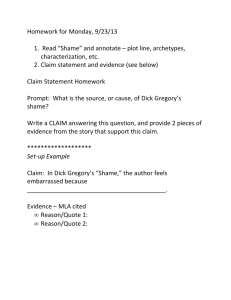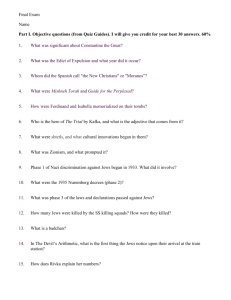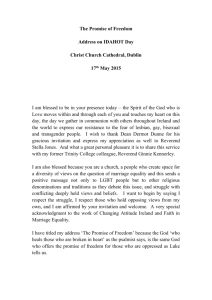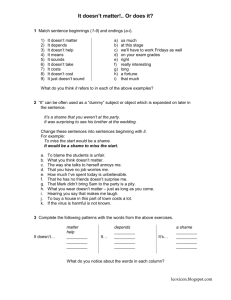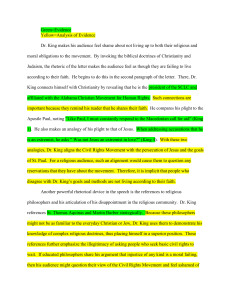Covenant Network Workshop by Warner M. Bailey
advertisement
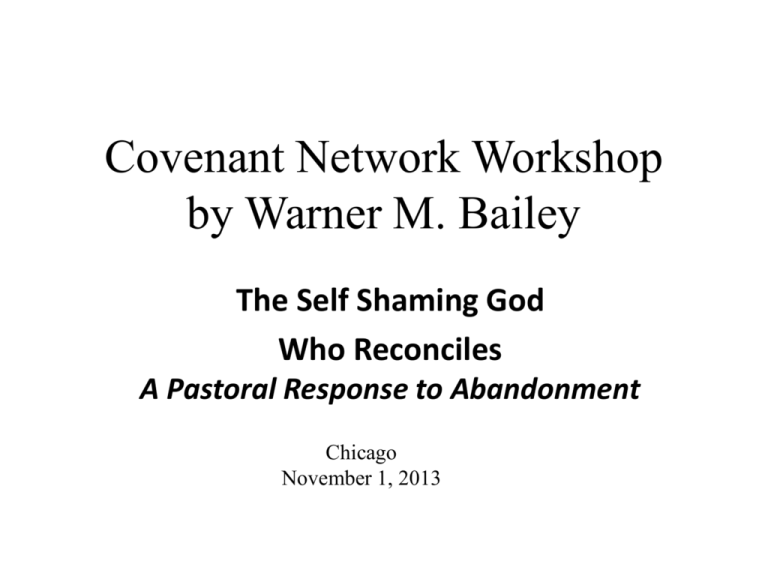
Covenant Network Workshop by Warner M. Bailey The Self Shaming God Who Reconciles A Pastoral Response to Abandonment Chicago November 1, 2013 2 Explanation of Title • What do I mean that God is self-shaming? • What do I mean by shame? • What do I mean by reconciliation? • Let’s start with the second question: What do I mean by shame? 3 Not the Honor/Shame Mores • Shame on you. • Honor asserted and defended. • Defeat of honor is shame. • I am talking about a different kind of shame. 4 This Book is about Shame as Something Done to You • Betrayal of trust and being put to shame. “O Lord in thee have I trusted, let me not be put to shame.” Ps. 22. • To be put to shame is to be made to feel as nothing. “ shall be ashamed…shall be as nothing…” Isaiah 41.11. 5 Emotional Affects of Being Put to Shame and Catalyst for Trauma Affect: “My heart is in anguish within me, the terrors of death have fallen upon me. Fear and trembling come upon me, and horror overwhelms me. “Ps 55.4-5 Cause: “My companion laid hands on a friend and violated a covenant with me. With speech smoother than butter, but with a heart set on war; with words that were softer than oil but in fact were drawn swords.” (vv.20-21) 6 The Aftershocks of Being Put to Shame Being Felt in the Community • “Let not those who hope in thee be put to shame through me…Let not those who seek thee be brought to dishonor through me.” Ps 69.6 • So the community has an urgent stake in any instances of being put to shame. 7 Summary of Being Put to Shame in the Bible • The axis of trust-betrayal-shame. • The devastation being put to shame causes. • The threat to community stability from personal shaming. 8 Modern Instances of Being Put to Shame. • • • • • Partner’s adultery. Battered or exploited child. Date-raped woman. GLTB “outed” in a humiliating way. Parent repudiated and abandoned by an adult child. • Employer embezzled by trusted employee. 9 Modern Instances continued • Pensioner defrauded her pension. • Parishioner taken advantage of by minister. • Older worker fired shortly before becoming eligible for retirement benefits. • Veteran denied medical benefits. (pg. 1 The Self-Shaming God) 10 Biblical Stories of Being Put to Shame. • Humans on Humans. • God on Humans. • Humans on God 11 Humans on Humans • Rape of Tamar. 2 Samuel 13 “Do not do this wanton folly…where could I carry my shame…you would be as one of the wanton fools in Israel.” (vv. 12-13) • David’s repudiation of his troops in the light of grief over Absalom. “You have covered with shame the faces of all your servants, who…have saved your life.” 2 Samuel 19.5-7 12 God on Humans • The complaint psalms. Again remember Psalm 22.5 “I have trusted in you; let me not be put to shame.” An appeal to God to honor the petitioner’s dependence. • “If the Psalmist should experience distress, sickness or the scorn of his community, then that is because God has failed him…An expression of outrage that others do not acknowledge and respond to his or her claims.” (M. Odell). (pg. 21 The Self-Shaming God) • Psalm 73, “All in vain have I washed my hands in innocence.” 13 Humans on God Acting Against Expectation • Isaiah 5. “When I expected it to yield grapes, why did it yield wild grapes?” • Hosea 11. The incorrigible son who matches God’s long-suffering care with deepening rejection. • Jeremiah 13. Israel pictured as a man’s unsupportive loincloth as an analogy of the refusal of the people to live up to God’s expectation to cling to God as God’s possession, a name, a praise and a glory. 14 A Vulnerable God “An ineffably transcendent God who yet communicates dynamically with the created world and is self-exposed to the wounds and limitations of reciprocity with the elect people and with all humanity.” (A. Lewis) (pg. 42 The Self-Shaming God) 15 Summary of Shame in Biblical Stories • The opening three sentences of my introduction: “Trust is at the heart of healthy relationships. When trust is broken, the victim is made to feel as nothing. The Bible calls this experience of betrayal “to be shamed.” When the victim names God as the betrayer, those who exercise pastoral care in the church are faced with a spiritual crisis of major proportions.” • “In an Age of Twisted Values” Glory to God, The Presbyterian Hymnal, p.345 16 God Makes a Way Beyond Shame The axis of trust-betrayal-shame in Psalm 73 • Trust: opening lines. Context is Psalm 1. Torah-piety • Betrayal: “… the wicked prosper…” • Shame: “All in vain!..” Renders speaker sub- human, mute. 17 The Threat to Community’s Power to Uphold The structural analysis, emphasizing Psalm 73.15 • Power of a faith community to exert its expectation upon the speaker. • Tug of the ‘circle of your children’ still holds when trust in God proves ill founded. • Against the force of shame, responsibility and obligation to those ‘who trust me’ is more powerful. (pg. 46 The Self-Shaming God) 18 The Power of Community • Provides motivation to remain engaged with God by whom one feels the shame of being let down. • Buttresses courage to remain engaged while suffering profound personal conflict. • Reflected in poem by Howard A. Walter, (1906) “I would be true, for there are those who trust me; I would be pure, for there are those who care; I would be strong, for there is much to suffer; I would be brave, for there is much to dare.” 19 The Community’s Stake in Outcome of Speaker’s Crisis The Community: • Sets a limit to how far shame-talk can go in making sense out of the speaker’s situation. • Operates to make ‘wearisome’ the speaker’s understanding of his/her situation. • Looms larger than the individual’s doubt. 20 Drawn Back into the Sanctuary • …By a commitment to remain true to ‘the circle of thy children’ and curb personal speech about shame. • …Where God vouchsafes a revelation of nearness. But for the hold of ‘the circle of thy children’ upon the psalmist this revelation might not have occurred.” (pg. 46 The Self-Shaming God) 21 Resolution in the Sanctuary Three results: • Validity of the claims of torah-piety reaffirmed • Self reflection resolved into new view of self and sense of awe • Shame releases its hold – Praise to God 22 Claims of Torah-Piety • Notion of goodness replaces material goods • Devaluation of all things physical • Favoring of intimate relationship of God “Whom have I in heaven but you? And there is nothing on earth that I desire other than you. My flesh and my heart may fail, but God is the strength of my heart and my portion forever” (Psalm 73.25) 23 Self Reflection and New View of Self • Devaluation of his/her status before God occurred Psalm 73.21-22. • Intimate knowledge of God’s continued faithfulness and promise of integrity into the future. • Integration into his/her character a sense of divine faithfulness through the dimension of awe (v. 25). 24 Shame Releases its Hold Praise to God! • Praise to God critical indicator that one has passed from the realm of behaving as brute beast and has joined the ranks of those who acknowledge their creaturely status before God. • Conclusion of Psalm 73 ends with the personal commitment to praise, “I have made the Lord God my refuge, to tell of all your works.” (pg. 47 The Self-Shaming God) • “In Deepest Night”, Glory to God, The Presbyterian Hymnal p.785 25 The Self-Shaming God Who Reconciles • Only that which God assumes can God redeem. This is a guiding conviction of early Greek theologians Gregory of Nyssa, Gregory of Nazianzus, and Basil the Great. • If God is to make a way for us to live beyond the experience of being put to shame, God has to take on, to assume, the shame of betrayal, and to triumph over it. • God has to take on the sin of the betrayer and create a redemption. 26 God putting Jesus to Shame on the Cross • Jesus went to the cross confident that the profound closeness he had with his Father would stick by him through the bitter end. All the rest of the world would know what it’s like to be betrayed by someone in whom you have put your trust. • But we know from reading the gospel accounts that he cried from the cross, “My God, my God, why have you forsaken me?” That is the cry of someone being put to shame. 27 God is Self-shamed • The Godhead takes on shame as the Father abandons the Son and the Son experiences abandonment by the Father. – When Jesus cries from the cross, the Father in whom he has trusted has deserted him. – The Father puts the Son to shame by deserting the Son. The Father is the cause of shame. • Bottom line: At the cross God creates shame inside the family of God. God takes on shame. God is selfshamed. • “Lord, Why Have You Forsaken Me” Glory to God, The Presbyterian Hymnal, 210 28 God Takes on Shame and Makes a Way to Live Beyond Shame • God’s integrity is in crisis for three days • On Easter, God the Spirit calls both Father and Son back from abandonment and betrayal. The family of God is whole again. • Jesus lives beyond what the worst of the experience of betrayal can do to victim and perpetrator. 29 Pastoral Implications • The recovery of an ancient evangelical message. “The one who believes in Jesus will not be put to shame” is central to the preaching of the early church. Romans 9.33, 10.11; 1 Peter 2.6 • My book revives this ancient piece of good news and makes it urgent for congregations today to preach, teach, and embody it in their common life. 30 Pastoral Implications continued • God’s solidarity with the shamed as an opportunity for living beyond shame. Jesus stands in solidarity with the shamed. • God’s solidarity with the one who bears the guilt of causing shame as an opportunity for reframing your life through confession and deliberate steps toward reintegration into the larger community. – Reconciliation as re-concilium. 31 Pastoral Implications continued • Elevation of the congregation as a prime setting for recovery of both shamed and shamer. • Worship as a place for movement beyond shame and as a place for confronting the shamer. • “We Cannot Measure How You Heal” Glory to God, Presbyterian Hymnal, p.797 32
